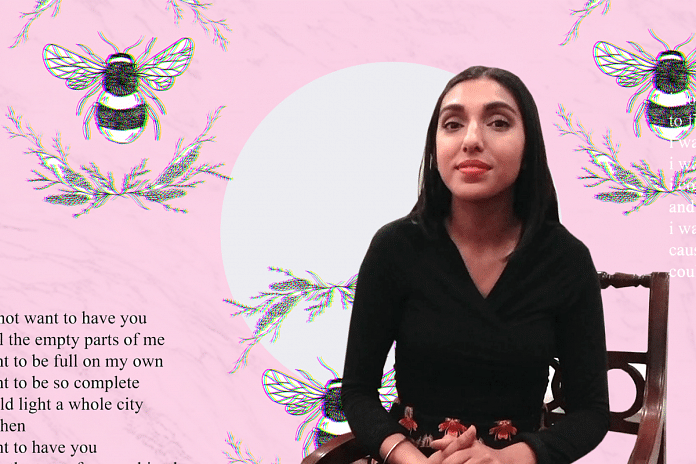Poet Rupi Kaur on growing up in an Indian-origin Canadian family, writing about sexuality and self-love, and the resulting awkwardness at home.
“If my parents asked ‘the’ questions about my poems, it would be really awkward,” says Rupi Kaur, one of the most popular poets in South Asia right now. Her work revolves around sexuality, self-love, and trauma.
Canadian Kaur, who now has over 2.2 million followers on Instagram, shot to fame through social media with her “byte-sized” poetry that is bold and uninhibited, and strikes a chord, particularly with women of colour.
One of the recurring themes in the 25-year-old’s books is reclaiming sex through the idea of self-love. However, being raised by Indian immigrant parents, Kaur also has to deal with awkward confrontations that take place because of her work.
“They (my parents) do read it, but they never comment on it… my dad is like – ‘in one ear and out the other’,” she says in a conversation with ThePrint in New Delhi Tuesday.
It’s often hard for young artists like Kaur, who are of Indian origin, to create art that is explicit and bold, because of the stigma attached with sex in Indian society, especially when raised in a conservative family where parents switch off the TV as soon as a sex scene comes on. Her famous poem ‘how we make up’, begins with the line “when we fight i see my father in you”, and then segues into a sexual encounter with her lover.
“When you read ‘how we make up’, that’s like a sexy, good-time piece. My dad did tell me, ‘when you go to India, don’t perform that one’. And I was like, ‘alright, whatever’. When I’m performing it, my mum will nudge my sister and say ‘I’m really happy she speaks really fast because I don’t understand all of it’,” Kaur says.
Rupi Kaur will be performing in Kamani Auditorium, Delhi Thursday.
Creativity breeds controversy
Kaur also talks about the controversy she was embroiled in three years ago, when Instagram removed a picture of her lying in bed with menstrual blood stains on the bed sheet and her pants. This was part of her university project to de-stigmatise menstrual blood, but it stirred a much bigger debate about Instagram’s censorship policies.
She recalls: “I remember, anything I’ve done that’s creative has caused some sort of controversy, even with the period photo. I was like ‘oh my god, my parents are going to kill me’ and my dad was like ‘people care about these things this much? Is that normal?’ So that’s the space that I come from. I’ve been very lucky because they see it as art and literature.”
However, she is quick to add how supportive her parents are towards her art as well. “They know exactly what I write about and they read it. My parents have read (her book) ‘milk and honey’, and I think I owe them so much because I was so scared. When I was publishing the book, I was like, ‘oh my god, I’m going to get into so much trouble’. But they give me space to create. It’s really important that they didn’t personalize it too much,” she says.






